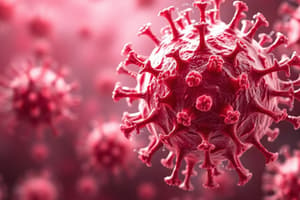Podcast
Questions and Answers
Which type of cell is classified as a professional antigen-presenting cell?
Which type of cell is classified as a professional antigen-presenting cell?
- Epithelial cells
- Endothelial cells
- Dendritic cells (correct)
- Fibroblasts
What is the role of MHC class I molecules in antigen presentation?
What is the role of MHC class I molecules in antigen presentation?
- They present peptides to CD4+ T cells.
- They activate macrophages directly.
- They present lipid antigens to B cells.
- They present peptides to CD8+ T cells. (correct)
Which type of antigen-presenting cell requires activation through phagocytosis?
Which type of antigen-presenting cell requires activation through phagocytosis?
- B cells
- Macrophages (correct)
- Dendritic cells
- Epithelial cells
What characterizes nonprofessional antigen-presenting cells?
What characterizes nonprofessional antigen-presenting cells?
In which pathway are intravesicular pathogens processed?
In which pathway are intravesicular pathogens processed?
Which cells present antigens in association with MHC class II molecules?
Which cells present antigens in association with MHC class II molecules?
What type of cells do CD1 molecules present lipid antigens to?
What type of cells do CD1 molecules present lipid antigens to?
What is the main function of professional antigen-presenting cells?
What is the main function of professional antigen-presenting cells?
What is the role of superantigens in T cell activation?
What is the role of superantigens in T cell activation?
Which of the following is an example of a superantigen?
Which of the following is an example of a superantigen?
What distinguishes endogenous antigens from exogenous antigens?
What distinguishes endogenous antigens from exogenous antigens?
Which T cell type recognizes antigens presented by MHC class I molecules?
Which T cell type recognizes antigens presented by MHC class I molecules?
What is a characteristic feature of T-independent antigens?
What is a characteristic feature of T-independent antigens?
What is the main function of antigen processing?
What is the main function of antigen processing?
Which statement accurately describes the size of antigenic determinants recognized by B cells?
Which statement accurately describes the size of antigenic determinants recognized by B cells?
How do CD4+ T cells recognize antigens?
How do CD4+ T cells recognize antigens?
What is a potential consequence of the polyclonal activation of B cells by T-independent antigens?
What is a potential consequence of the polyclonal activation of B cells by T-independent antigens?
Which molecules serve as co-receptors for T cells?
Which molecules serve as co-receptors for T cells?
How are T-dependent antigens primarily characterized?
How are T-dependent antigens primarily characterized?
What is a consequence of the hyperactivation of the immune system due to superantigens?
What is a consequence of the hyperactivation of the immune system due to superantigens?
How do superantigens differ from conventional T-dependent antigens?
How do superantigens differ from conventional T-dependent antigens?
What is a primary requirement for T cells to recognize processed antigenic determinants?
What is a primary requirement for T cells to recognize processed antigenic determinants?
Which of the following compositions do T cell-recognized antigenic determinants mainly have?
Which of the following compositions do T cell-recognized antigenic determinants mainly have?
In terms of antigen processing, what is essential for epitope presentation to T cells?
In terms of antigen processing, what is essential for epitope presentation to T cells?
Study Notes
Superantigens
- Superantigens can activate up to 25% of T cells, significantly more than conventional antigens.
- Examples:
- Staphylococcal enterotoxins: Cause food poisoning.
- Staphylococcal toxic shock toxin: Linked to toxic shock syndrome.
- Staphylococcal exfoliating toxins: Responsible for scalded skin syndrome.
- Streptococcal pyrogenic exotoxins: Associated with shock.
- Diseases caused by superantigens result from hyperactivation of the immune system and cytokine release by T cells.
Antigen Processing and Presentation
- Antigen Processing: Digests proteins into peptides for display with MHC class I or II molecules on cell membranes.
- Endogenous Antigens: Processed within the cell's cytoplasm.
- Exogenous Antigens: Internalized via phagocytosis or endocytosis and processed in the endocytic pathway.
- T cells recognize antigens as short peptides presented by MHC class-I (for CD8+ T cells) or MHC class-II (for CD4+ T cells).
T Cell Recognition
- CD4+ T cells interact with MHC class-II; CD8+ T cells interact with MHC class-I, determined by co-receptors.
- CD4 molecule binds to the β2 domain of MHC class-II.
T-independent and T-dependent Antigens
-
T-independent Antigens:
- Directly stimulate B cells, commonly polysaccharides.
- Characterized by repeated polymeric structures.
- Induce polyclonal activation of B cells and are resistant to degradation.
-
T-dependent Antigens:
- Require T cell assistance for antibody production, typically proteins.
- Feature a few copies of numerous antigenic determinants.
Antigenic Determinants
-
Recognized by B cells:
- Composed of proteins, polysaccharides, nucleic acids with both linear and conformational determinants.
- Typically sized 4-8 residues, with a focus on immunodominant epitopes.
-
Recognized by T cells:
- Mainly proteins (some lipids), processed and presented via MHC.
- Typically sized 8-15 residues and limited to those that can bind to MHC.
Antigen-Presenting Cells (APCs)
- Only cells presenting peptides with MHC class II to CD4 T cells are classified as APCs; those presenting MHC class I are target cells.
- Types of APCs:
- Professional APCs:
- Dendritic cells: Most effective APCs, high MHC class II and co-stimulatory molecule expression.
- Macrophages: Require activation via phagocytosis for MHC class II expression.
- B cells: Constitutively express MHC class II but need activation for co-stimulatory expression.
- Nonprofessional APCs: Can act as APCs temporarily during inflammation (e.g., epithelial and endothelial cells).
- Professional APCs:
Pathways of Antigen Processing
- Two distinct processing pathways:
- Cytosolic (Endogenous) Pathway: For pathogens replicating in the cytosol, presenting to CD8+ T cells via MHC class I.
- Vesicular (Endocytic) Pathway: For intravesicular pathogens, presenting to CD4+ T cells via MHC class II.
CD1 Molecules
- Group 1 CD1 molecules present lipid antigens to a diverse range of T cells, aiding adaptive immunity against various microbial lipid antigens.
Studying That Suits You
Use AI to generate personalized quizzes and flashcards to suit your learning preferences.
Related Documents
Description
Explore the fascinating world of superantigens and their role in T cell activation. This quiz covers various examples of superantigens, including those from Staphylococcus and Streptococcus bacteria, and their implications in diseases such as food poisoning and toxic shock syndrome.




